-
 Bitcoin
Bitcoin $103,528.9455
1.74% -
 Ethereum
Ethereum $2,640.2435
8.75% -
 Tether USDt
Tether USDt $0.9998
-0.04% -
 XRP
XRP $2.5553
4.71% -
 Solana
Solana $179.9792
7.01% -
 BNB
BNB $660.2916
2.69% -
 USDC
USDC $0.9997
-0.04% -
 Dogecoin
Dogecoin $0.2386
9.03% -
 Cardano
Cardano $0.8165
5.03% -
 TRON
TRON $0.2716
3.73% -
 Sui
Sui $3.9640
3.22% -
 Chainlink
Chainlink $17.1893
6.51% -
 Avalanche
Avalanche $26.0265
10.40% -
 Stellar
Stellar $0.3105
4.05% -
 Shiba Inu
Shiba Inu $0.0...01608
8.14% -
 Hedera
Hedera $0.2124
5.09% -
 Pi
Pi $1.2611
19.49% -
 Toncoin
Toncoin $3.4395
7.21% -
 Hyperliquid
Hyperliquid $25.4158
7.55% -
 Polkadot
Polkadot $5.1776
6.78% -
 UNUS SED LEO
UNUS SED LEO $8.7878
2.26% -
 Bitcoin Cash
Bitcoin Cash $408.3998
3.95% -
 Litecoin
Litecoin $103.3464
2.61% -
 Monero
Monero $346.8209
4.15% -
 Pepe
Pepe $0.0...01399
7.81% -
 Bitget Token
Bitget Token $4.8001
3.92% -
 Dai
Dai $0.9998
-0.02% -
 Ethena USDe
Ethena USDe $1.0004
-0.04% -
 Uniswap
Uniswap $6.8937
5.19% -
 Bittensor
Bittensor $460.5593
3.00%
What is the principle of generating a Dogecoin wallet address?
Dogecoin addresses, derived from a private key via elliptic curve cryptography and hashing, are unique and secure, ensuring transaction verification while safeguarding user funds; recovering the private key from the address is computationally impossible.
Mar 06, 2025 at 03:18 pm
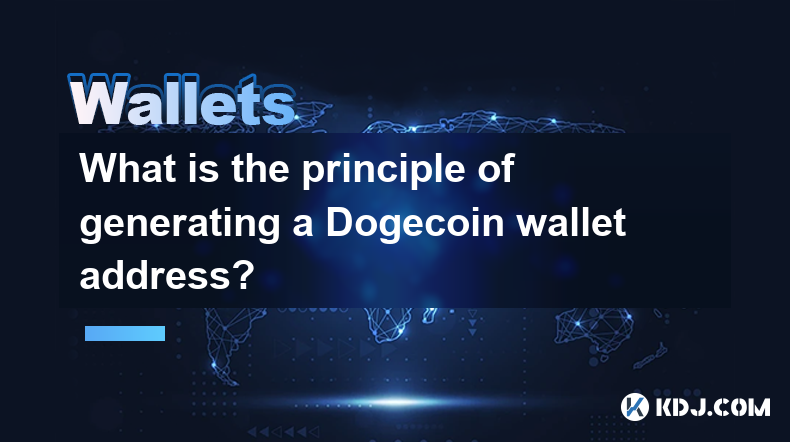
What is the principle of generating a Dogecoin wallet address?
Key Points:
- Dogecoin wallet addresses, like those for other cryptocurrencies, are not randomly generated strings. They are derived through a complex cryptographic process involving elliptic curve cryptography (ECC) and hashing algorithms.
- The process ensures uniqueness, security, and allows for verification of transactions.
- Understanding the underlying principles helps users appreciate the security mechanisms inherent in Dogecoin transactions.
- Several factors contribute to the address generation, including the user's private key, which must be kept absolutely secret.
- Public keys and addresses are derived from the private key, but the reverse process is computationally infeasible.
Understanding Dogecoin Wallet Address Generation
The generation of a Dogecoin wallet address isn't a simple random number generator; it's a sophisticated process rooted in cryptographic principles. Let's break down the steps involved:
- Step 1: Generating a Private Key: This is the foundation of the entire process. The private key is a randomly generated, extremely large number (typically 256 bits). This number is essentially the secret password to your Dogecoin wallet. It's crucial to understand that losing your private key means losing access to your Dogecoins forever. There's no way to recover it. Software wallets and hardware wallets use various methods to generate these keys, employing techniques like cryptographic random number generators to ensure true randomness and prevent predictability. The generation process must be robust against biases and vulnerabilities, as any weakness could compromise the security of the entire system. The quality of the random number generator used is paramount; weak generators can lead to predictable keys, making your Dogecoin vulnerable to theft. The process often involves combining multiple sources of entropy (randomness) to enhance security, such as system time, mouse movements, and network activity.
- Step 2: Deriving the Public Key: The private key itself is never directly used in transactions. Instead, it's used to derive a public key through a process involving elliptic curve cryptography (ECC). ECC is a type of public-key cryptography that uses the mathematics of elliptic curves to create secure cryptographic keys. Specifically, Dogecoin uses the secp256k1 curve, a standardized curve widely used in cryptocurrencies. The process involves applying mathematical operations to the private key, resulting in a completely different, yet mathematically related, public key. This transformation is a one-way function; it's computationally infeasible to derive the private key from the public key. This is the cornerstone of the security of Dogecoin and many other cryptocurrencies. The public key is much larger than the private key, but equally essential. It's this public key that will be used to verify transactions and receive Dogecoins. The mathematical operations involved in this step are complex and rely on sophisticated algorithms to ensure the integrity and security of the generated public key.
- Step 3: Hashing the Public Key: The public key, while crucial, is still too long and unwieldy to be used as a wallet address. Therefore, the public key is further processed using cryptographic hashing algorithms. Hashing is a one-way function that takes an input (in this case, the public key) and produces a fixed-size string of characters (the hash). Dogecoin utilizes a specific hashing algorithm, often involving multiple stages of hashing to ensure the output is both unique and secure. This hash is a fingerprint of the public key, and any alteration to the public key will result in a completely different hash. The hashing process ensures that even minor changes in the public key will produce drastically different addresses, minimizing the risk of collisions (two different keys producing the same address). The security of the hashing algorithm is paramount; weak hashing algorithms could lead to vulnerabilities and potential collisions, compromising the security of the address generation process.
- Step 4: Encoding the Hash: The hash generated in the previous step is still a raw binary representation. To make it human-readable and usable in transactions, it needs to be encoded. Dogecoin uses Base58Check encoding, which is a method for encoding binary data into a string of alphanumeric characters. Base58Check adds a checksum to the encoded string, providing an additional layer of security against errors and manipulation. The checksum allows for verification of the address's integrity; any errors in transmission or alteration of the address will be detected during verification. This encoding process is essential for making Dogecoin addresses user-friendly and preventing errors during transactions. The Base58Check encoding avoids characters that are easily confused (like 0, O, 1, l) to minimize errors during manual entry.
- Step 5: Creating the Dogecoin Wallet Address: The final output of this process is the Dogecoin wallet address – the string of alphanumeric characters you see and use to send and receive Dogecoin. This address is a unique identifier linked to your public key, allowing others to send you Dogecoin. It's important to emphasize that the address itself does not contain your private key; it's merely a representation derived from it through the cryptographic processes described above. The address is designed for public sharing; you can safely provide it to others without compromising your private key. The security of the address is dependent on the strength of the underlying cryptography and the secure generation of the initial private key.
FAQs
Q: Is it possible to reverse-engineer a Dogecoin address to obtain the private key?
A: No. The process of generating a Dogecoin address is a one-way function. While the address is derived from the private key, it's computationally infeasible to reverse this process. The cryptographic algorithms used (ECC and hashing) are designed to make this practically impossible, even with the most powerful computers.
Q: How can I ensure the security of my Dogecoin wallet address?
A: The security of your Dogecoin wallet address relies on the security of your private key. Never share your private key with anyone. Use a reputable wallet provider, preferably a hardware wallet for enhanced security. Be wary of phishing scams and malware that could steal your private key.
Q: What happens if I lose my private key?
A: If you lose your private key, you lose access to your Dogecoins. There is no recovery mechanism. This is why it is crucial to store your private key securely and back it up properly.
Q: Are all Dogecoin wallet addresses unique?
A: Yes, due to the cryptographic nature of the address generation process, the probability of two different private keys generating the same Dogecoin address is astronomically low. The use of robust hashing algorithms and the vast size of the key space ensure uniqueness.
Q: Can I generate a Dogecoin wallet address manually?
A: While theoretically possible, it's highly impractical and risky to generate a Dogecoin wallet address manually. You would need to implement the cryptographic algorithms correctly, which requires significant expertise in cryptography and secure coding practices. Using established wallet software is far safer and more reliable.
Disclaimer:info@kdj.com
The information provided is not trading advice. kdj.com does not assume any responsibility for any investments made based on the information provided in this article. Cryptocurrencies are highly volatile and it is highly recommended that you invest with caution after thorough research!
If you believe that the content used on this website infringes your copyright, please contact us immediately (info@kdj.com) and we will delete it promptly.
- Man Finds 1469 Roman Coins Buried in a Romanian Field
- 2025-05-14 12:05:13
- VanEck Launches VBILL, a Tokenized Fund That Enables Access to Short-Term US Treasuries On-Chain
- 2025-05-14 12:05:13
- United States President Donald Trump Will Probably Trigger an Indirect Crypto Market Rally
- 2025-05-14 12:00:31
- MEXC Points to Bitcoin Dominance Drop and Ethereum's Surge as Signs of a Coming Altcoin Season
- 2025-05-14 12:00:31
- Looking to Buy the Next Big Cryptocurrency? These 3 Cryptos Could Skyrocket This Year
- 2025-05-14 11:55:13
- Bitcoin Set for “Mega Expansion” as Chart Signals Parabolic Price Spike
- 2025-05-14 11:55:13
Related knowledge
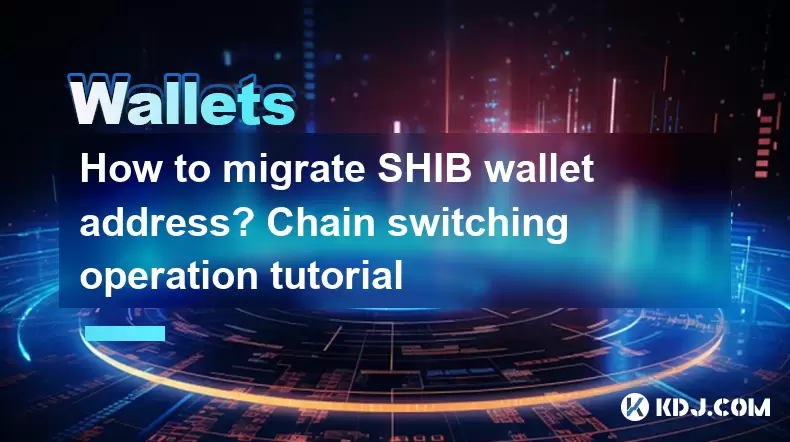
How to migrate SHIB wallet address? Chain switching operation tutorial
May 14,2025 at 07:35am
Migrating your SHIB wallet address and performing a chain switching operation can be crucial for managing your cryptocurrency effectively. This process involves several steps that need to be followed carefully to ensure that your assets remain secure and accessible. In this tutorial, we will guide you through the process of migrating your SHIB wallet ad...
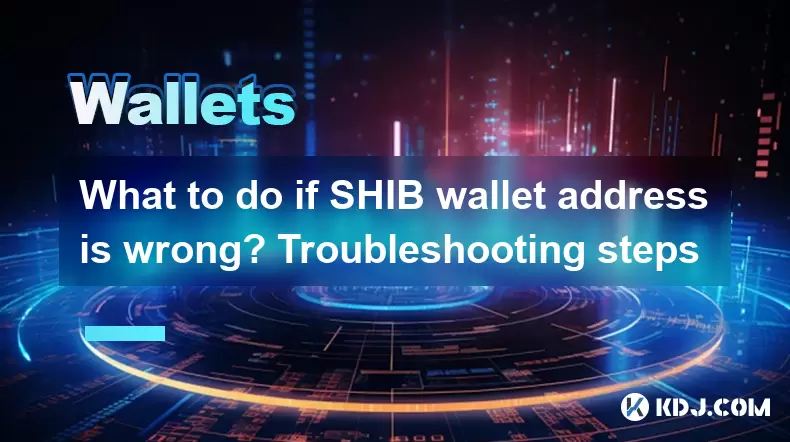
What to do if SHIB wallet address is wrong? Troubleshooting steps
May 14,2025 at 04:28am
If you've entered the wrong SHIB wallet address, it can be a stressful situation, especially if you've already sent your SHIB tokens. However, there are several steps you can take to troubleshoot and potentially resolve the issue. Let's walk through the process step-by-step. Verify the Transaction DetailsThe first thing you should do is verify the trans...
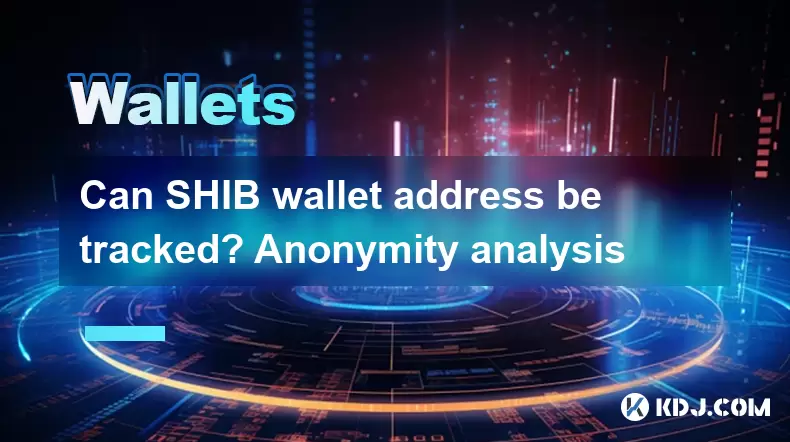
Can SHIB wallet address be tracked? Anonymity analysis
May 14,2025 at 06:50am
The question of whether a SHIB wallet address can be tracked and the level of anonymity it provides is a crucial concern for many users in the cryptocurrency space. SHIB, or Shiba Inu, is a popular meme token that operates on the Ethereum blockchain. Understanding the traceability of SHIB wallet addresses involves delving into the nature of blockchain t...
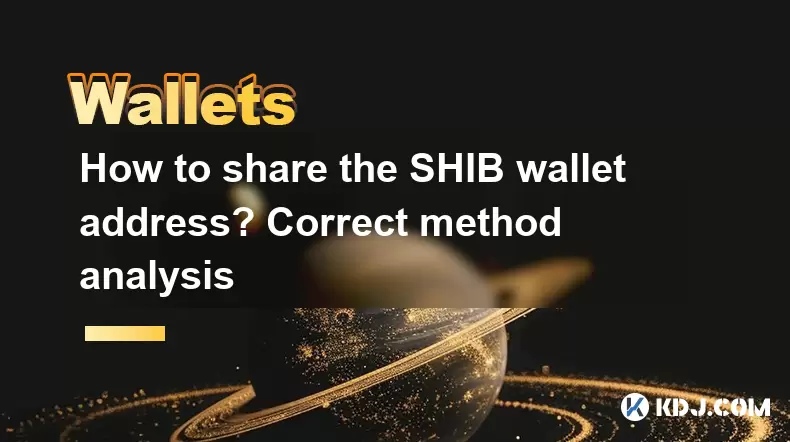
How to share the SHIB wallet address? Correct method analysis
May 14,2025 at 02:50am
Sharing your SHIB wallet address is a common task for those involved in the cryptocurrency world, particularly if you're dealing with Shiba Inu (SHIB) tokens. However, it's crucial to understand the correct methods to share your wallet address to ensure the safety and security of your funds. This article will guide you through the process and highlight ...
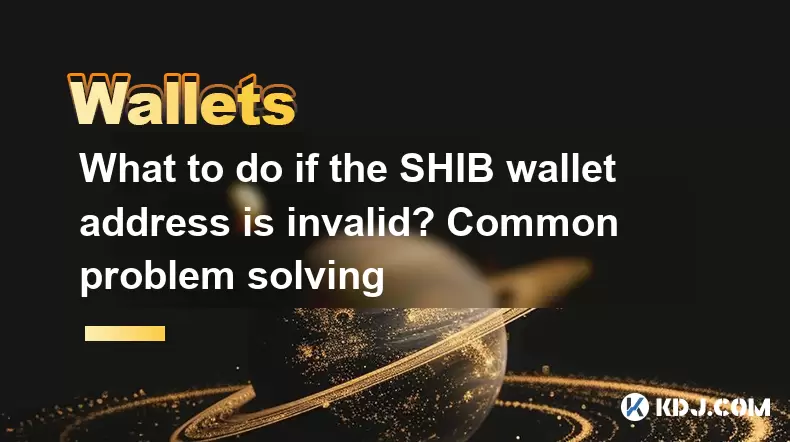
What to do if the SHIB wallet address is invalid? Common problem solving
May 14,2025 at 09:14am
If you're dealing with an invalid SHIB wallet address, it can be a frustrating experience, especially if you're trying to send or receive SHIB tokens. Understanding why this happens and how to solve it is crucial for anyone involved in the cryptocurrency space. This article will guide you through the common issues associated with an invalid SHIB wallet ...
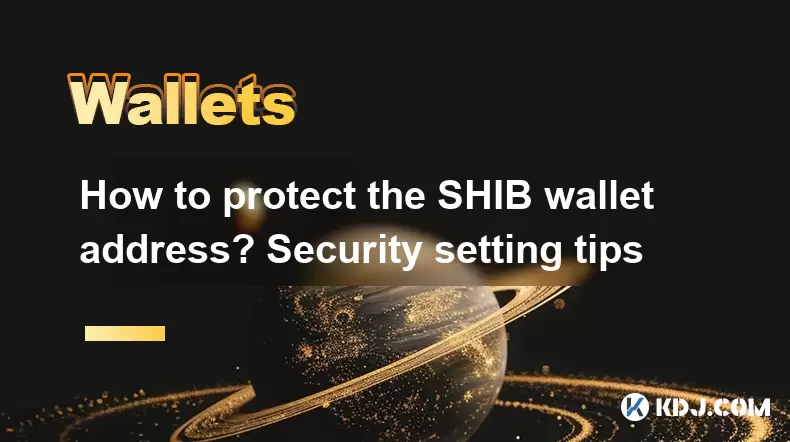
How to protect the SHIB wallet address? Security setting tips
May 13,2025 at 04:07pm
Protecting your SHIB wallet address is crucial to safeguarding your cryptocurrency assets. With the rise of digital currencies, securing your wallet has become more important than ever. This article will provide you with detailed security setting tips to ensure your SHIB wallet remains safe from potential threats. Understanding SHIB Wallet SecurityBefor...

How to migrate SHIB wallet address? Chain switching operation tutorial
May 14,2025 at 07:35am
Migrating your SHIB wallet address and performing a chain switching operation can be crucial for managing your cryptocurrency effectively. This process involves several steps that need to be followed carefully to ensure that your assets remain secure and accessible. In this tutorial, we will guide you through the process of migrating your SHIB wallet ad...

What to do if SHIB wallet address is wrong? Troubleshooting steps
May 14,2025 at 04:28am
If you've entered the wrong SHIB wallet address, it can be a stressful situation, especially if you've already sent your SHIB tokens. However, there are several steps you can take to troubleshoot and potentially resolve the issue. Let's walk through the process step-by-step. Verify the Transaction DetailsThe first thing you should do is verify the trans...

Can SHIB wallet address be tracked? Anonymity analysis
May 14,2025 at 06:50am
The question of whether a SHIB wallet address can be tracked and the level of anonymity it provides is a crucial concern for many users in the cryptocurrency space. SHIB, or Shiba Inu, is a popular meme token that operates on the Ethereum blockchain. Understanding the traceability of SHIB wallet addresses involves delving into the nature of blockchain t...

How to share the SHIB wallet address? Correct method analysis
May 14,2025 at 02:50am
Sharing your SHIB wallet address is a common task for those involved in the cryptocurrency world, particularly if you're dealing with Shiba Inu (SHIB) tokens. However, it's crucial to understand the correct methods to share your wallet address to ensure the safety and security of your funds. This article will guide you through the process and highlight ...

What to do if the SHIB wallet address is invalid? Common problem solving
May 14,2025 at 09:14am
If you're dealing with an invalid SHIB wallet address, it can be a frustrating experience, especially if you're trying to send or receive SHIB tokens. Understanding why this happens and how to solve it is crucial for anyone involved in the cryptocurrency space. This article will guide you through the common issues associated with an invalid SHIB wallet ...

How to protect the SHIB wallet address? Security setting tips
May 13,2025 at 04:07pm
Protecting your SHIB wallet address is crucial to safeguarding your cryptocurrency assets. With the rise of digital currencies, securing your wallet has become more important than ever. This article will provide you with detailed security setting tips to ensure your SHIB wallet remains safe from potential threats. Understanding SHIB Wallet SecurityBefor...
See all articles






















































































